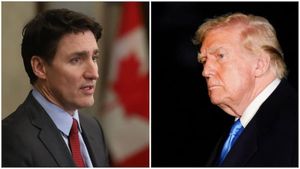The Danish Prime Minister Mette Frederiksen recently announced her willingness to allow the United States to increase its military presence in Greenland, highlighting the importance of the Arctic region for national security. This declaration came prior to the commencement of an EU summit held in Brussels.
Frederiksen stated, "I fully agree with the Americans...find a way to have a stronger footprint in Greenland." This posits Denmark's acknowledgment of the growing strategic significance of the High North, particularly when it concerns defense and security measures.
Although the U.S. already maintains military facilities on the largely autonomous island, Frederiksen mentioned her openness to explore new opportunities for U.S. military expansion. She emphasized, "When itcomes to securing our part of the world, we can find a way forward,” solidifying Denmark's commitment to bolstering its defense capabilities alongside its American ally.
The nature of U.S.-Denmark relations took center stage amid tensions resulting from former President Donald Trump's contentious interest in Greenland, often framed as part of national security strategies. Trump's administration had even floated the notion of purchasing the resource-rich territory, prompting widespread discussions about sovereignty and security.
Frederiksen’s recent comments are part of the Danish government's efforts to maintain clarity on Greenland's status. She earnestly stated, “I totally agree with the Americans...find a way to have stronger footprints in Greenland,” alluding to mutual interests shared with the U.S. and reiteration of Denmark's stewardship over the island.
Her statements come as Denmark plans to invest approximately €2 billion to modernize their defense systems, anticipating increased military cooperation with NATO partners, including the U.S. This allied positioning symbolizes Denmark’s proactive approach to address security concerns arising from the unpredictable geopolitical climate, especially as climate change opens new maritime routes and resource opportunities.
Frederiksen also took the opportunity to respond to U.S. Vice President JD Vance’s remarks questioning Denmark’s reliability as an ally. "I do not accept being called a bad ally. We are not, never have been and we will not be in the future," she asserted, reinforcing Denmark's commitment alongside its American counterparts.
The significance of Greenland has only heightened on the global stage, with its strategic location and abundant resources making it increasingly relevant for defense strategies, especially as Arctic interests expand. The responses from Denmark suggest not only a willingness to accommodate U.S. military needs but also aspirations for greater collaboration within NATO frameworks.
Geopolitically, negotiations surrounding military presence on the island reflect the broader theme of power dynamics not only between nations but also within regional organizations. Wars, climate change, and resource scarcity have become defining parts of international relations, especially for Arctic territories.
The current atmosphere highlights how Greenland's strategic importance is igniting discussions about military expansions and diplomatic alliances. Denmark seeks to assert its control over the territory, deeming it non-negotiable, and stands united with allies to address shared defense concerns.
With Denmark’s firm declarations about its alliance with the United States and messages of military preparedness, the dynamics oscillate between partnership and territorial integrity. This delicate balance will undoubtedly shape the future conversations surrounding military or economic cooperation pertinent to Greenland.
This newfound emphasis on military presence should be seen within the larger narrative of global security, with countries like Denmark and the U.S. responding to contemporary threats and opportunities. From the pursuit of strategic operational footholds to managing national identities, the future of Greenland remains pivotal within the overarching framework of transatlantic relations.
Frederiksen’s emphasis on the non-negotiable status of Greenland served to clarify Denmark's standpoint amid speculation, perhaps even placate concerns within the international community surrounding U.S. ambitions. It remains to be seen how these dialogues evolve but, with strong alliances and clearly articulated intentions, the groundwork has been laid for meaningful interactions within the Arctic region.



